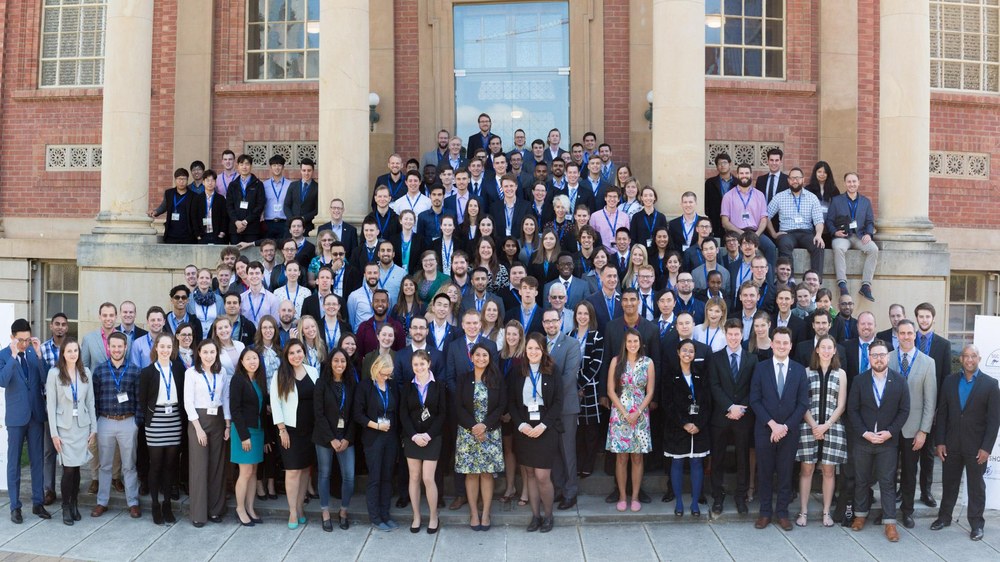Powered by DLR - German students at the International Astronautical Congress
The city of Adelaide in the south of Australia hosted over 4500 aerospace enthusiasts during the 68th International Astronautical Congress (IAC) from 25 to 29 September 2017. This annual congress brings together global stakeholders from the aerospace field, ranging from representatives of all major space agencies and institutions, to private enterprises and the next generation of start-ups and students. Immediately prior to the IAC, the Space Generation Congress (SGC), organised by the Space Generation Advisory Council (SGAC), was also held, as it has been for the past 16 years. This year, it was the gathering point for 150 students and young professionals from the aerospace industry (aged 18–35). The fast-paced, three-day programme featured talks, discussions and team work on current issues within the aerospace field. Among the participants from over 40 nations there were two German students, Daniel Wischert and Joshua Kiefer, both sponsored by the DLR Standout Student Scholarship.
The SGC programme consists partly of expert talks by high-level players in the aerospace field, and this year's speakers included representatives of NASA, UNOOSA, Lockheed Martin and Blue Origin. But participants of the SGC spend a large portion of their time in animated discussions and brainstorming sessions in the topical work groups. Assigned to one of six groups, they debate on issues in categories ranging from space exploration to space policy.
This year, Daniel Wischert's Space Innovation work group dealt with the 'Moon Village' vision first shared by ESA Director General Jan Wörner. All members were warmly invited to contribute their own expertise and ideas to develop new impetus for the fulfilment of the Moon Village concept. The group received professional support from ESA experts and others.
All six work groups presented their findings and recommendations to the participants and SGC expert audience at the end of the three days. The group findings will be used to prepare full reports in the months following the Congress, as a means of ensuring that the opinions of the younger generation are heard by the right people. A summary of the findings will also be prepared for the United Nation's Committee on the Peaceful Uses of Outer Space (COPUOS).
In addition to the technical part, socialising and sharing experiences with other participants were also important aspects at the SGC. The 150 students and young professionals have amassed an impressive background of expertise and practical experience, working in all kinds of companies and organisations within the aerospace sector, which consistently sparks surprising and exciting discussions. Additionally, the attending experts provide the opportunity to acquire insight into the more experienced and senior levels of the aerospace sector. The informal and sociable atmosphere at the SGC is an ideal breeding ground.
The subsequent IAC Congress took place in a similar setting, but on a far larger scale. 4500 participants, 200 technical sessions, panel discussions and an extensive exhibition ensured a wealth of impressions over the five days. While the sheer magnitude appeared a little daunting to the two students at the start of their first IAC event, they soon got the hang of things. Moving between talks and panel discussions, the exhibition hall and the next reception, they soon worked out the lay of the land and learned to appreciate the varied programme. Where else can you spend the morning in an informal setting, asking questions to directors of the world’s leading aerospace companies, before heading over for an afternoon coffee with a Space Shuttle commander? Pascale Ehrenfreund, Chair of the DLR Executive Board, also took the time for a discussion round with the students.
The final hours of the IAC were reserved for a long-anticipated highlight: the talk by Elon Musk. The next IAC will take place in Bremen. So Daniel and Joshua advise all aerospace enthusiasts among their fellow students or young professionals aged 18 to 35 to apply to SGAC for accreditation. The application process usually takes place in May. For more information, visit the SGAC website.

